
Marketing is an ever-growing field, and one that provides a great deal of room for creativity, innovation and exciting campaigns – not least when it comes to film promotion. Good marketing strategies can guarantee a movie’s success and thrust low-budget films into an unexpected spotlight.
These 10 campaigns used a wide range of techniques to bring their movies to the forefront of public consciousness. Methods included parody trailers, elaborate treasure hunts, and even talks from the future – but see for yourself.
Going beyond the use of simple marketing materials, successful promotions can invite viewers into an alternate reality, extend the entertainment factor of the movie, and ultimately entice audiences to the theater. In short, marketing campaigns are a crucial part of any movie production, and they can ensure that the opening weekend of a film makes it a smash hit rather than a box office flop.
10. The Muppets
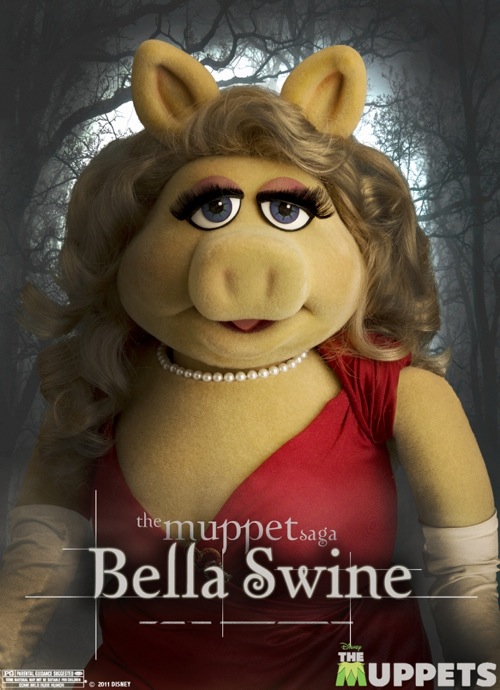
2011’s The Muppets faced a unique challenge, as it had been 12 years since the fuzzy characters had appeared on the big screen. Although the Muppets are still held in high regard, some wondered whether they could make the transition and be appreciated by today’s audience. However, the funny puppets did just that, and the film’s success might well have been partly down to a marketing campaign that made them relevant and even hip.
The viral marketing crusade included a massive Facebook Fan-A-Thon, as well as lots of hilarious trailers and posters parodying movies that were due to hit the box office at around the same time. Among the spoofs were Breaking Prawn and The Pig with the Froggy Tattoo. The film’s stars also showed up on Google+ Hangouts, and the movie had a presence on Twitter, Google+ and mobile apps, too.
These smart tactics made people aware of the upcoming movie and caught the attention of millions. The Muppets made well over $29 million on its opening weekend in the US, second only to The Twilight Saga: Breaking Dawn – Part 1 over the same Thanksgiving time-frame.
9. The Dark Knight

The Muppets clearly had a handle on the social media side of cyberspace, but The Dark Knight’s promotional run also utilized the power of the Internet – and then some. Despite the movie not hitting box offices until July 2008, the marketing campaign was launched as early as spring 2007. The drive included multiple websites – notably IBelieveInHarveyDentToo.com and WhySoSerious.com – designed to make the world of Gotham City come alive.
Back in the physical realm, fans could get involved in an alternate-reality game that eventually led the curious to local bakeries. Those who arrived first received a cake decorated with a phone number; and upon calling the number, they were recruited into the Joker’s army.
Other elements of the campaign included a major push at Comic-Con 2007 that gave convention-goers the chance to vote for Harvey Dent (at the same time as real-life Presidential Primaries were running), plus balloons containing secret missives, sneak peek pictures of the Joker at his deranged best, and T-shirt giveaways. The movie itself made over $1 billion globally.
8. Inception
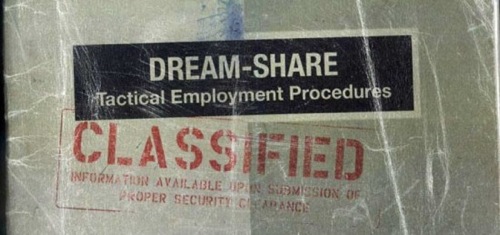
2010’s Inception was an unusual movie because it was hard to explain in simple terms. The story itself was original and mysterious, but this, combined with the fact that the film wasn’t part of a franchise, made it somewhat problematic to market.
Even so, the viral campaign actually capitalized on the film’s elements of secrecy and complexity. “Your mind is the scene of the crime” was its tagline, and a website titled as such was launched. The site featured a maze game that people could solve to unlock posters plus other bits and pieces about the movie.
Verizon released a “Protect Your Dreams” app, Wired featured a Dream-Share manual, and a clip was “leaked” that showed director Christopher Nolan talking with dream experts. A Facebook presence also drew attention to the movie and caught people up in the action. Inception ultimately took over $62 million in its opening weekend and pulled in $800 million worldwide overall.
7. Cloverfield
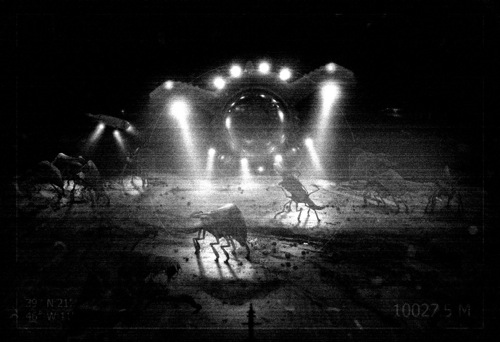
Cloverfield also used elements of mystery in its viral campaign prior to hitting the big screen in January 2008. The monster, which is the linchpin of the entire movie, was not shown anywhere before the theatrical release. This generated plenty of curiosity, and people undoubtedly started combing the Internet for clues as to its nature. The promotion team attached their first trailer, without a title, to the then-highly anticipated Transformers movie. Although the film’s name this was eventually revealed, the secrecy garnered lots of hype.
Other clever marketing methods used included Myspace pages, a fictional drink, an imaginary Japanese drilling company, strange websites, and further teaser trailers. In the end, the movie grossed over $170 million worldwide.
6. District 9
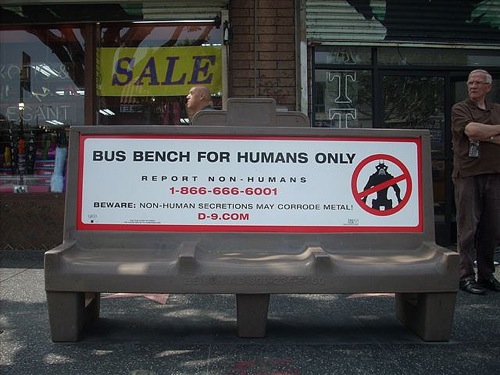
The 2009 movie District 9 was comprehensively marketed online, but what set its campaign apart were its non-Internet elements. Bus stops, benches and vehicles all had signs emblazoned on them warning that they were for “humans only.” The telephone numbers on these signs sent callers through to a fictional company called Multi-National United (MNU).
Meanwhile, four different websites offered clues into the content of the movie, and promotion was also carried out through Facebook and Twitter. Two and a half months after the film’s release, it had grossed almost $211 million. Not bad for a movie with a $30 million budget.
5. Jurassic Park
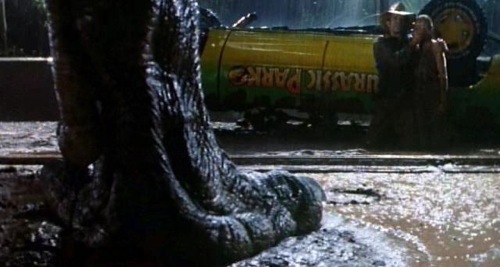
Jurassic Park was released in 1993, at a time when the Internet was still a novel and relatively obscure concept. However, the success of its marketing proved that creative promotions could make a movie go viral – even without a huge online presence.
The campaign strategy included contracting scores of companies to promote over 1,000 themed items. These included a McDonald’s meal complete with dino-sized fries and a cheeseburger to satisfy a Tyrannosaurus’s appetite. There were also Dino Eggs and Raptor Bites candies, action figures, toothbrushes, puzzles and more.
Trailers, meanwhile, revealed only peeks of the reptilian creatures, compelling audiences to see the movie. Jurassic Park eventually grossed over $914 million across the globe – an incredible sum, and one that was no doubt boosted by its marketing.
4. Paranormal Activity
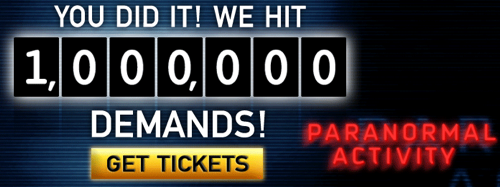
Paranormal Activity was created in 2007 for a mere $15,000 by first-time director Oren Peli. It had a limited release at festivals, but it was so well done that it soon caught the attention of Paramount. The studio bought the movie, altering it slightly – including changing its ending – and then put it out on limited release.
Viewers of Paranormal Activity were encouraged to “Tweet Their Screams,” sharing what they thought of the movie on Twitter – which amounted to predominantly positive responses, with little space in a Tweet for criticism. As news was spreading through word of mouth, Paramount began to use a website called Eventful. The site allowed people to “demand” that the movie be shown in their hometown. Once the film reached one million demands, it was released nationally, on October 16, 2009. It raked in over $193 million in total.
3. Prometheus
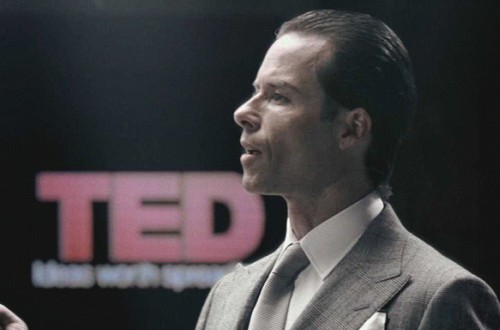
The marketing team behind Ridley Scott’s Prometheus used plenty of innovative ideas to promote the hotly anticipated 2012 production. One of the characters from the movie, Peter Weyland (played by Guy Pearce), conducted a pretend TED talk from the future – the year 2023. First shown at a real-life TED conference, the video tied in to the fictitious Weyland Industries website.
Elsewhere, an advertisement for the David 8 android was featured in The Wall Street Journal, while the robot himself had a Twitter account through which to answer people’s questions. Other devices included a virtual tour of the Prometheus spaceship and the release of further intriguing videos. In France, a Paris Métro ghost station was even decked out in honor of the film, complete with eerie lighting and a huge stone head. The boundaries between fact and fiction were blurred, and Prometheus pulled in $403 million at the box office.
2. The Simpsons Movie
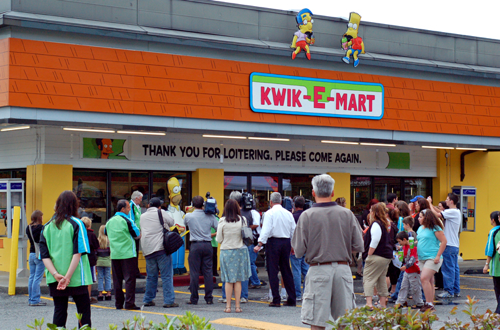
Promotion for The Simpsons’ 2007 big-screen debut started out with a simple virtual tour of Springfield, but it soon snowballed into a creative, viral campaign. Contests were held among towns named Springfield around the world in order to decide which one would show the premiere. In addition, Homer appeared on The Tonight Show with Jay Leno, Samsung brought out a Simpsons-branded phone, and Ben & Jerry’s concocted a special ice cream called “Duff and D’oh! Nuts.”
However, the campaign’s winning move came when a dozen 7-Eleven stores were turned into Kwik-E-Marts – and they even offered tailored Simpsons merchandise such as Squishees and Buzz Cola. The Simpsons Movie made more than $30 million on its opening day in the US, and it would eventually gross over $527 million worldwide.
1. The Blair Witch Project
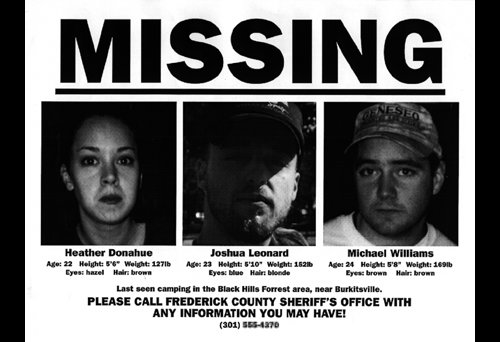
The Blair Witch Project was released in 1999, and its entire strategy was to make people believe that the fictional documentary-style movie was actually a factual account. A website was created to present some of the “evidence” – thus backing up the all-too-real-seeming trailer – and police reports, in-depth back story, legends about the Blair Witch, photos and interviews were all circulated.
Even in the days before social media sites like Twitter and Facebook, the ploy generated masses of hype, and this was further propelled by rumors on online message boards and “official” IMDb profiles for each actor that listed them as dead. The Blair Witch Project went on to garner international success, sweeping in gross earnings of almost $250 million – and this with a budget of just $22,000. It was a ground-breaker in proving just how much mileage a good viral marketing campaign can gain and a true first-of-its-kind.